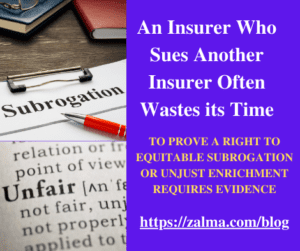An Insurer Who Sues Another Insurer Often Wastes its Time

See the full video at https://rumble.com/v1bjjfl-july-8-2022.html and at https://youtu.be/wrzfI8EXlCk
TO PROVE A RIGHT TO EQUITABLE SUBROGATION OR UNJUST ENRICHMENT REQUIRES EVIDENCE
Two insurers of Gateway Science & Engineering’s (“Gateway”): Admiral and ACE American settled a suit against Gateway and then Admiral sued ACE American to recover its share of the settlement. Admiral Insurance Co. (“Admiral”) appealed the district court’s decision granting ACE American Insurance Co.’s (“AAIC”) motion for summary judgment. In Admiral Insurance Company, a Corporation v. ACE American Insurance Company, No. 21-55789, United States Court of Appeals, Ninth Circuit (July 5, 2022) the Ninth Circuit resolved the suit.
FACTS
Gateway’s work as the manager for a construction project in Los Angeles was protected by insurance coverage under Admiral’s professional liability policy (the “Admiral Policy”), which covered claims resulting from negligence in Gateway’s provision of professional services. Gateway also obtained coverage under AAIC’s commercial general liability policy (the “AAIC Policy”), which generally covered claims resulting from bodily injury or property damage. The Admiral Policy excluded claims covered by a commercial general liability policy and the AAIC Policy excluded claims arising from Gateway’s “rendering of or failure to render any professional services.” By their terms, the policies did not overlap, but insured against different risks of loss.
Hartford Fire Insurance Company (“Hartford”) sued Gateway alleging that Gateway’s negligence had damaged the construction project. AAIC and Hartford agreed to settle all claims against Gateway covered by the AAIC Policy. A month later, Admiral and Hartford agreed to settle the remainder of Hartford’s claims against Gateway.
THE APPEAL
Admiral then sued AAIC alleging that, as part of its settlement agreement with Hartford, Admiral had paid Hartford to settle claims for which AAIC was responsible. Admiral appealed the federal district court’s decision to grant AAIC’s motion for summary judgment as to six claims:
breach of the implied duty to settle;
breach of the contractual duty to indemnify;
breach of the implied duty to indemnify;
equitable indemnity;
equitable subrogation; and
unjust enrichment.
ANALYSIS
Although an insurer has a “duty to settle once liability of the insureds bec[o]me[s] reasonably clear,” [Blue Ridge Ins. Co. v. Jacobsen, 25 Cal.4th 489, 504 (2001) (quoting State Farm Fire &Cas. Co. v. Coop. of Am. Physicians, Inc., 163 Cal.App.3d 199, 204 (1984)], “an insurer has no obligation to pay money in settlement of a noncovered claim,” [Marie Y. v. Gen. Star Indem. Co., 110 Cal.App.4th 928, 958 (2003).]
By settling all claims covered by the AAIC Policy, AAIC satisfied the duty to settle.
Although an insurer has a duty to indemnify the insured for those sums that the insured becomes legally obligated to pay as damages for a covered claim, that duty arises only after liability is established. Because all claims against Gateway were settled before liability was established, the duty to indemnify never arose.
The Ninth Circuit, therefore, concluded that Admiral cannot recover under the doctrines of equitable indemnity or equitable subrogation. Equitable indemnity applies only where two insurers were obligated to indemnify or defend the same loss or claim. Since the AAIC Policy and the Admiral Policy did not overlap with each other AAIC and Admiral were not “obligated to indemnify . . . the same . . . claim[s],” and, as a result, Admiral’s claim for equitable indemnity failed.
In turn, equitable subrogation applies only where one party pays a debt for which another is primarily liable. By settling all claims covered by the AAIC Policy, AAIC erased any debt it owed to Hartford. With that debt erased, Admiral’s settlement with Hartford could not have paid a debt for which AIC was primarily liable. The Ninth Circuit also concluded that Admiral’s claim for equitable subrogation failed.
For similar reasons, Admiral’s claim for unjust enrichment failed because, under California law, the elements for a claim of unjust enrichment are receipt of a benefit and unjust retention of the benefit at the expense of another.
Because AAIC settled all claims covered by the AAIC Policy, AAIC did not receive a benefit from Admiral’s settlement with Hartford. Accordingly, Admiral’s unjust enrichment claim failed.
ZALMA OPINION
Equitable Subrogation, Equitable Indemnity, and unjust enrichment claims require two insurers insuring the same risks of loss. Since the two insurers insured different risks of loss neither are entitled to anything from the other.
(c) 2022 Barry Zalma & ClaimSchool, Inc.
Barry Zalma, Esq., CFE, is available at http://www.zalma.com and zalma@zalma.com.
Subscribe and receive videos limited to subscribers of Excellence in Claims Handling at locals.com https://zalmaoninsurance.locals.com/subscribe.
Subscribe to Excellence in Claims Handling at https://barryzalma.substack.com/welcome.
Like this:
Loading…







